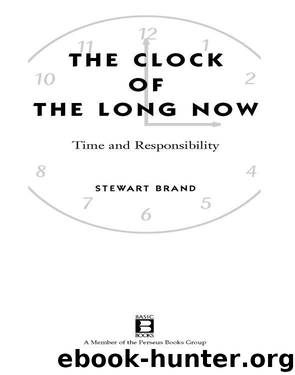Clock of the Long Now by Stewart Brand

Author:Stewart Brand
Language: eng
Format: epub
Publisher: Basic Books
Published: 2010-05-31T16:00:00+00:00
Such a museum could, if necessary, be not just a collection of curiosities but a template for renewal. When civilizations truly crash, no one at the time can imagine the depth of the fall, nor how labored and long the revival, if it ever happens. After Rome fell, “Europe went unwashed for a thousand years.” Cities emptied; literacy vanished. All the Roman achievements of engineering, culture, and government simply ceased to be. Population in some areas dropped by nine-tenths. Even with the heroic continuity of the Catholic Church, the skein of culture was reduced to fragile wisps: Only one copy of Lucretius made it through the Dark Ages, only one copy of five books of Livy, one copy of nine plays of Euripides, one copy of Tacitus, one copy of Beowulf.
Of the fifteen to twenty thousand distinct languages once spoken two-thirds are extinct, and the pace of loss is increasing. “The death of a language,” writes George Steiner, “be it whispered by the merest handful on some parcel of condemned ground, is the death of a world.”
Civilization now is global. It is ever more tightly linked and ever more leveraged out over the abyss on an elaborate superstructure of highly sophisticated technology, every part of which depends on the success of every other part. All this may make it more robust against catastrophe, or more frail, we don’t know yet. What we do know is that a global collapse cannot count on some other civilization coming to the rescue, since by then there will be no other. It is strange to contemplate, except in light of thousands of years and the demise of twenty-some previous civilizations.
Perhaps the 10,000-Year Library should be thought of as an insurance provider. It offers detailed risk assessment of the chances civilization is taking (which might be enlightening in its own right) and promises resources for recovery if, God forbid (as insurance agents say), the worst should happen.
The scientist James Lovelock, best known for his Gaia theory of life-mediated regulation of the atmosphere, has proposed compiling a start-up manual for civilization, beginning with how to make fire, moving on through all of science and technology, from subjects such as ancient genetic design (domesticating plants and animals by selective breeding) to current genetic design (cloning). “Who would guard such a book?” Lovelock asks. “A book of science written with authority and as splendid a read as Tyndale’s Bible might need no guardians. It would earn the respect needed to ensure it a place in every home, school, library, and place of worship. It would then be on hand whatever happened.”
Lovelock worries about science skills being lost because they have become so widely scattered into countless narrow specialties. His civilization primer would be the great cross-disciplinary reference work. Doug Carlston lists other categories of endangered information: “information that was important to many but held by few, old information (Dead Sea Scrolls), restricted information (Stasi files), information of importance over long periods of time (gene structures, seismic records, weather, seeds!), information held largely in highly degradable form (Technicolor movies).
Download
This site does not store any files on its server. We only index and link to content provided by other sites. Please contact the content providers to delete copyright contents if any and email us, we'll remove relevant links or contents immediately.
| Concrete | Extraction & Processing |
| Fracture Mechanics | Materials Science |
| Metallurgy | Polymers & Textiles |
| Strength of Materials | Testing |
Whiskies Galore by Ian Buxton(40729)
Introduction to Aircraft Design (Cambridge Aerospace Series) by John P. Fielding(32370)
Small Unmanned Fixed-wing Aircraft Design by Andrew J. Keane Andras Sobester James P. Scanlan & András Sóbester & James P. Scanlan(32155)
Craft Beer for the Homebrewer by Michael Agnew(17473)
Turbulence by E. J. Noyes(7084)
The Complete Stick Figure Physics Tutorials by Allen Sarah(6658)
Kaplan MCAT General Chemistry Review by Kaplan(6086)
The Thirst by Nesbo Jo(5819)
Bad Blood by John Carreyrou(5799)
Learning SQL by Alan Beaulieu(5447)
Weapons of Math Destruction by Cathy O'Neil(5070)
Man-made Catastrophes and Risk Information Concealment by Dmitry Chernov & Didier Sornette(4779)
iGen by Jean M. Twenge(4714)
Digital Minimalism by Cal Newport;(4612)
Life 3.0: Being Human in the Age of Artificial Intelligence by Tegmark Max(4536)
Audition by Ryu Murakami(4126)
Electronic Devices & Circuits by Jacob Millman & Christos C. Halkias(4064)
1,001 ASVAB Practice Questions For Dummies by Powers Rod(4058)
Pale Blue Dot by Carl Sagan(4031)
